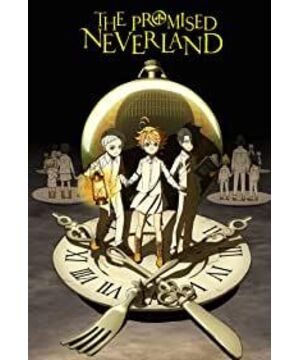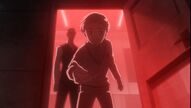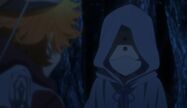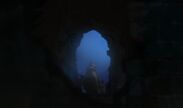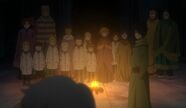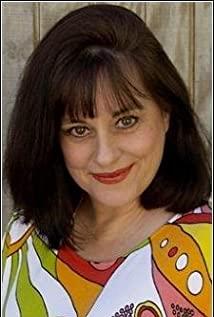After watching the twelve episodes of the animation in one night, it took another day to follow the manga to the latest episode. I feel that the author is expanding the perspective step by step from the human center of the farm to the whole world where the human world and the ghost world coexist but are isolated from each other. worldview. In the entire twelve episodes of the current animation plot, the story focuses on how Emma and others discovered the truth, planned to escape from the farm, and escaped the fate of becoming a ghost dish, where ghosts and humans are predators and prey "Natural relationship", one hunts, the other flees. This is not an equal life game where you die and I die, but eating and harvesting under the laws of "natural", wolves are for sheep, cats are for mice, and ghosts are for people. The disparity between the power of ghosts and humans has already been presented in the first episode, and there is very little information about ghosts in the subsequent plots. Therefore, in the escape chapter, ghosts have not yet achieved real meaning for Emma and others. At the level of "enemy", ghosts are a symbol of death and despair, and being eaten by ghosts is a given destiny. And who is the enemy? Mom is the enemy.
Mother and Emma, who are both human and bear the same fate, stand on the opposite side of consciousness. Knowing that death is inevitable, knowing the truth is excruciatingly painful, knowing that the status quo cannot be changed, whether to live a happy life under the wall until the moment of death, or to live every moment of life for that unattainable Struggling with freedom and autonomy? Is ignorance the happiest way to live? Can happiness and freedom be equal?
Mother (Isabella) was born on a farm as a food child, helplessly watched her friend leave, jumped over the fence and found that it was an abyss; her female identity gave her the opportunity to become a "mother", and thus became a farm The continuous operation of the fertility machine, after giving birth, she returned to the farm to become a breeder who managed edible children, sending each child to the mouth of the ghost with her own hands.
An endless loop of despair. Every link devoured her cleanly, and she had thousands of reasons to give up and weave bubbles of happiness.
A gentle and considerate mother, a close and lovely family, simple but delicious food, difficult but interesting learning and testing, and timely and happy games and play, are they a little in line with today's human society's imagination of a happy childhood? Carefree and innocent.
Our basic image of children today is carefree, innocent, or, more harshly, happy because of ignorance. But the children in the promised Neverland burst out with another kind of power, because they are naive, so fearless, maybe they don't have a grand perspective, they just simply consider the situation in front of them, keep thinking, keep thinking, think that they can What to do and how to do it.
The adult consciousness represented by mother and the child consciousness represented by Emma and others also reflect this opposition. Freedom is beautiful and cruel, and the natural innocence makes edible children not give up in desperate situations, and keep thinking, I think this is the value of the people conveyed by the prison break. Think, even if it is painful, don't give up thinking, the spark of freedom will be ignited in an instant.
In the comic plot after the animation, the author made a switch from the perspective of the main body, and the human beings represented by edible children became the other in a complete sense in the society of ghosts.
What is a human being from a de-anthropocentric perspective? In the setting of the promised Neverland, the children of Emma and other orphanages have two status symbols. First, they are human beings with self-awareness; second, they are eating human beings and raising them. The field was born and raised exclusively to become food for another species (ghost). Edible children are not plundered and occupied by ghosts in the human world. Edible children are produced (born) in a complete ghost society, which is a daily and ordinary part of the operation of the ghost society. Outside the fence is the world of ghosts' daily life. Edible children are raised, imprisoned and tamed by ghosts; complete and efficient production lines, edible children are transported to the ghost's dining table according to the established procedures, everything is logical and natural. And all of this in human society, replacing ghosts with adults, replacing people with chickens on farms, replacing them with ducks, and replacing them with pigs is the same.
Perhaps most people may have momentary reflections on moral pauses when watching the daily feeding of the farm or during the eating process, but they will not attempt to change the existing order and structure of society. People will be hungry, and what moral justification is needed for such a natural need? But hunger may be hunger, and what becomes food is determined by society.
It's just that in the ghost society, humans are chosen to be food.
In the society of ghosts, is human self-consciousness (thinking) valuable? valuable. It is a sign of nutrition and delicacy, and the more active the mind, the richer the nutritional value of the brain. It is a rare and high-quality food, nothing more. Ghosts don't need to consider people's needs and emotions, it's just a meal, just to survive, what should be condemned? If the plundering of human life as a meal on a plate is immoral and unjustified, then it is acceptable and consensus can be reached to breed human beings exclusively for food.
The fable of the human farm is that subject status is not natural and we should reflect on how we will behave when human beings are on the edge of the world.
Domination or coexistence?
(Although I haven’t watched too many animes, I feel that it is really commendable for jump comics to have women as the protagonists, and Emma is the spiritual core of the team, always adhering to the principle that no one is missing, pure and fearless, Brave and straightforward, I really like it.)
View more about The Promised Neverland reviews


